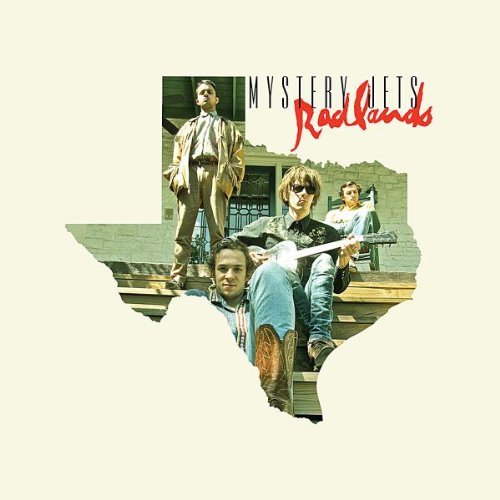Music
Mystery Jets break the singles mold with ‘Radlands’

Radlands
Mystery Jets
Release Date: Jun 05, 12
- 1
- 2
- 3
- 4
- 5
- 6
- 7
- 8
- 9
- 10
Some bands are “singles” bands. And though people are always more inclined to worship the album over the individual single, I think being a “singles” band can be quite admirable. The best of The House of Love’s discography is still the 1986-88: The Creation Recordings compilation, and the most famous record by the Buzzcocks is and always will be Singles Going Steady. In the modern world, it should make more sense for a band to be a “singles” band, but the pressure of albums’ past, and the statement bands’ feel the need to make, gives the excuse for a band to pair the great singles with a bunch of so-so tracks that feel rushed. London band, Mystery Jets, seem to perfectly match this modern musical plight.
Despite writing some terrific songs on their last two albums, Serotonin and Twenty One (which features a cameo from the elusive Laura Marling, plus arguably the Jets’ best song, “Two Doors Down”); Mystery Jets can never seem to create a consistently listenable record. So for their fourth album, and second on Rough Trade, Mystery Jets temporarily relocated to Austin, Texas, where they have managed to write their best record, and perhaps their most polarizing towards their normally British-fare. Radlands might be somewhat of a silly title (a supposed combination of the Terrence Malick film Badlands, and Keith Richards’s mansion-estate, Redlands), but on their fourth album, Mystery Jets drop their 80s influence for some very American psychedelic & country rock ‘n roll.
The opener and title track of Radlands is the perfect prescription of Doves-like vibes mixed with terrific slide-guitar playing. Sitting at 5 ½ minutes, it has the potential to be a chilling yet grand opener at Glastonbury or Roskilde. “You Had Me At Hello” starts out in very dark, gothic country-fashion, but the chorus is big, beautiful, and recalls psychedelic soul-era Temptations. Third track, “Someone Purer” is slow and dark in the verses like the last one, but the chorus builds into big arena-rocking “ooos” and a repeating of “give me rock ‘n roll” that only an English voice could pull off without sounding cheesy. “The Ballad of Lonestar Emerson” isn’t quite as immediate at the first three tracks, but ends in a wonderful coda, and the last minute of each song so far seems to really be where producer Dan Carey’s influence stands out in his affection for vocal effects. “Greatest Hits” is very Kinks-like, and is an instant “indie-kid” love song as it references not just the Kinks, but Neutral Milk Hotel, Wings, and The Fall’s This Nation’s Saving Grace. The chorus of “Greatest Hits” has an appropriate amount of “sha-la-la”’s, and is the most instantaneous so far on Radlands.
“The Hale Bop” is very Beck-sounding in how it somehow manages to be psychedelic, country-ish, funky, and poppy all at the same time. The sixth track is perhaps the most dance-insisting song of the Jets’ since the aforementioned “Two Doors Down.” Track seven, “The Nothing” is a return back to Doves-like reverb, and gothic country, but once again, the chorus is big and beautiful, and ends with a possible reference to being away from England for so long with “bring me back something beautiful.” “Take Me Where The Roses Go” returns back to a Beck-like style of guitar, but it’s surprisingly a terrific and affectionate country duet featuring soulful songbird Sophie Rose Harper. Next track “Sister Everett” has very big organ, and despite it being listenable; unfortunately feels like it’s trying too hard to be like The Walkmen (though, there aren’t many better bands to want to be like). The tenth track, “Lost In Austin” is Radlands’s longest song, and perhaps one of its best. “Lost In Austin” has a timeless slow ballad quality to it, and is as somber as it is radio friendly all before exploding into a gigantic arena-rocking frenzy with singer Blaine Harrison begging to “take me to the end, I’m not scared.” The closer, “Luminescence” is a sad, Muswell Hillbillies-like drunken track that’s a very journalistic song, with lyrics that manage to show a distaste towards English-life yet missing it simultaneously.
Radlands is a consistent country-tinged affair, and not only has the most radio-friendly hits of any other Mystery Jets album, but also manages to never really have a dull moment. Though there aren’t any truly astonishing moments, the album itself is still very listenable, and definitely admirable. Dan Carey produces the album very well, but doesn’t overuse his influence like he’s done in the past (which was evident on Franz Ferdinand’s disappointing Tonight: Franz Ferdinand). Mystery Jets seem more than ever together as a band despite losing and replacing longtime bassist Kai Fish earlier this year.
I always find it very interesting when British musicians devote themselves to adapting to a very American country rock ‘n roll sound. It interests me because rarely do you see Americans doing the same thing to English music. But much like Muswell Hillbillies did in the early 70s, Radlands respectfully and appropriately committed to an American sound yet did not let its British influence stray too far. In eleven tracks, Mystery Jets have made the album of their career, and though it undoubtedly should see success in the U.K., it would not surprise me if the Jets’ saw stateside success as well. Radlands may not be the best album of the year, but it’s perhaps one of the most impressive Brit pop albums since the start of the decade.